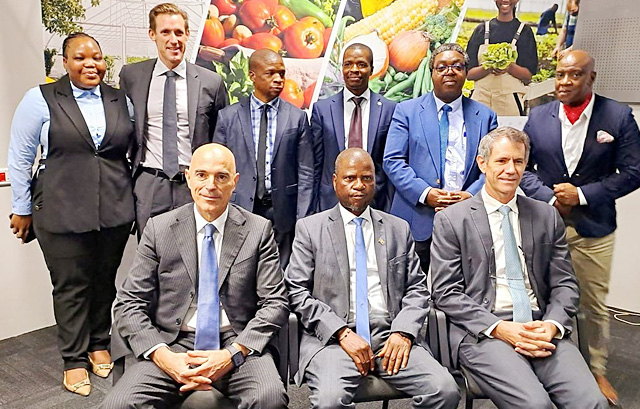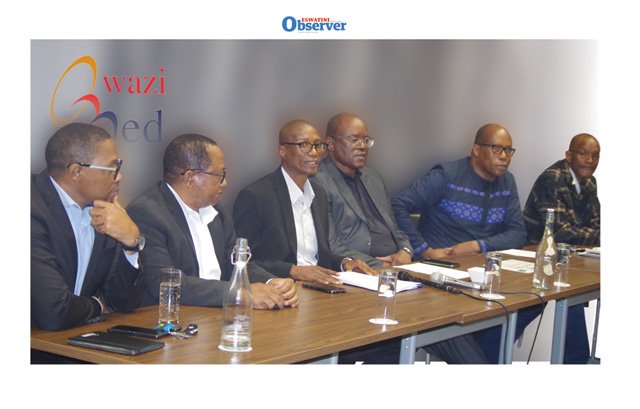By Majaha Nkonyane | 2018-03-03

Trade Union Congress of Swaziland (TUCOSWA) has decried the recently announced Value Added Tax (VAT) hike which was announced by Finance Minister Martin Dlamini on Thursday when delivering the 2018/19 budget speech.
“Mr. Speaker, revenue is expected to increase by two per cent in 2018/19 to E16.7 billion, excluding grants.
The increase is attributed to policies expected to be implemented in 2018/19, which are aimed at reducing reliance on SACU revenue.
These include increasing the VAT standard rate from 14 per cent to 15 per cent to align with the new rate announced by the Republic of South Africa and to maintain the ‘Sekulula’ refund arrangement,” he said.
announcement
The minister’s announcement has been met with mixed, mostly by negative reactions, where the business sector has voiced out how unhappy they are with the decision.
“Government attitude towards this subject is wrong and as the business sector we are not happy with such surprises, especially because this affects how we operate,” Federation of Swaziland Business Community (FESBC) CEO Dudu Nhlengethwa said.
It was noted that government needs to at least consult with the business sector on such crucial decisions, especially because they were not on such issues.
The sector is further pleading with the government to consult with both the public and private sector.
In addition, the sector is hopeful that the incoming minister after elections will note the importance of consulting the sector on such issues.
“We are currently facing a lot of problems as is and this hike will add on to the many problems that we are currently dealing with. It is important to note that we are not fighting with authorities but we are requesting that the government engages us,” she said.
On another note, TUCOSWA has equally voiced out their concern on the hike and they are equally not happy.
The congress mentioned that the working class in the country is currently overtaxed and the hike will come in as a challenge.
“The cost of living as we speak is too high for the working class and such hikes are hard hitting and we are not happy with what was announced by the minister.
We understand that the county is benchmarking with neighbouring countries like South Africa and it won’t be easy for us as a country,” TUCOSWA deputy secretary general Muzi Mhlanga said.
In addition, Mhlanga decried the announced review of the VAT Act to allow taxation of electricity at the standard rate in order to encourage domestic electricity generation.
This was noted as too much and taxing the people to the bone. They are said to be currently consulting and are proposing to stage a march so to sensitise government on the hike.
Furthermore, the banking sector is concerned about improvements that have been said to come over the years but none have been seen.
“The minister detailed efforts to rein in wastage and to improve public finance management. This has been a consistent theme for many years, but there does not seem to be tangible progress.
No amount of income generation will close the funding gap if political will and courage is not demonstrated to eliminate wastage,” bankers association president Dennis Mbingo said. Mbingo also noted that the more SRA and other streams collect, the bigger the expenditure holes.
“It becomes a vicious cycle that large scale corruption feeds on.
We are reaching a turning point where bold action on corruption and wastage is becoming necessary for our financial survival,” he said.
…Bankers also unhappy with proposed bank revenue levy
The Swaziland Bankers Association (SBA) has voiced its concerns over the proposed introduction of a levy on banks’ revenue.
The association, through its President Dennis Mbingo, made it clear that this new levy would negatively affect investment decisions, lending decisions, expansion plans and staffing decisions. “These are now being reviewed by some of the banks as we speak. All these are contributors to national growth,” he said.
Minister of Finance Martin Dlamini in his budget speech delivered in Parliament on Thursday highlighted government’s intention of introducing a new levy on banks which will help the country diversify on its revenue sources instead of being heavily dependent on the Southern African Customs Union (SACU).
Amidst other concerns, the bankers association also wondered why bank taxes are being increased amidst moves to drop the cost of banking and to improve financial inclusion.
“There is also legitimate pressure to drop the cost of banking and to improve financial inclusion, which the banking sector fully supports. How do we drop these and extend our coverage by adding more taxes on revenue lines?” wondered SBA, also voicing the local banking fraternity’s anticipation of platforms which will help find answers to these issues.
SBA hastened to add that the country’s banking sector stability remains a selling point for Swaziland and is key to drawing new investment.
“This proposal, if not carefully unpacked and explained urgently, could destabilise the banking sector and force a revision of investor appetite for the country,” SBA warned, further making it clear that some banks may not survive this move in the long term.
SBA said achieving certainty around pronouncements like these remain critical not just for banking, but for the country. In his budget speech, the minister of finance had said the country’s revenue was expected to increase by two per cent in 2018/19 to E16.7 billion, excluding grants. He said this increase would be a result of soon to be implemented policies aimed at reducing reliance on the SACU revenue. He highlighted one such policy as being the introduction of a bank revenue levy.
While registering discontent over the proposed bank revenue levy, SBA reiterated its support to government for additional revenue streams.
“It does not benefit us to leave the state to carry some of the burden of getting the country back to fiscal stability alone, and they fully, understand the need for a give and take”. SBA described the minister’s budget as being “a very, very difficult” one and the minister himself as being a “credible steward of a massive finance portfolio through some of its most challenging times. Nevertheless, the banking fraternity made it clear that the minister’s budget had also “triggered deep concerns for future growth”, adding: “It is not an easy budget by any measure and carries substantial execution risk. It also carries the risk of unintended consequences, especially on cost of living, business sustainability and employment”.
Business should stop being
overly reliant on govt – SBA
Like the minister of finance, the Swaziland Bankers Association also discourages businesses from being heavily dependent on government.
“We are experiencing a growing list of businesses that are narrowing activities or closing because of long payment cycles,” the SBA said in a statement issued by President Dennis Mbingo.
“The minister has been very correct in his advice that business needs to reduce its dependence on government, but escaping that loop requires the payment of existing obligations. We have a looming crisis and the banking sector is currently carrying a significant portion of the risks and costs to this,” he said.
Mbingo lauded improvements made on some of the controls and conditions around the proposed ‘arrear bonds’ and introducing certainty on who ultimately gets paid and in what objective prioritisation method could improve take on by banks. The association further described the budget as being honest though providing little confidence on long term answers.
‘Bold action must be
taken to curb corrupt’
While appreciating the minister’s detailed efforts to rein in wastage and to improve public finance management, the Swaziland Bankers Association says bolder action must be taken on corruption and wastage for the country’s financial survival.
“This has been a consistent theme for many years, but there does not seem to be tangible progress. No amount of income generation will close the funding gap if political will and courage is not demonstrated to eliminate wastage,” SBA said in a statement, adding that the more that SRA and other streams collect, the bigger the expenditure holes. “It becomes a vicious cycle that large scale corruption feeds on”.
share story
Post Your Comments Below
Social media users have reacted with shock and sorrow to the death of former Mhlume Unite...

Sisonkhe FC ……........….. (0)2
Mpendulo 55th, Thab...

The E851million Smallholder Agricultural Productivity Enhancement and Marketing Project (SAPEMP) ...

THE recent turn of events at SwaziMed has underscored deep-rooted governance challenges that thre...
All material © Swazi Observer. Material may not be published or reproduced in any form without prior written permission.
Design by Real Image Internet